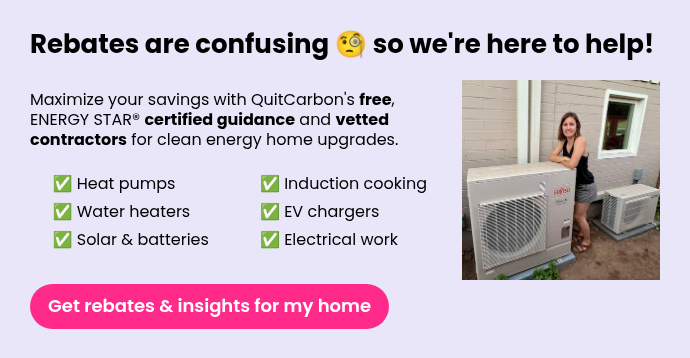What you need to know about federal tax credits for solar and batteries
Key information for getting your 30% tax credit for last year's solar and battery system
How you can save on this year's taxes from last year's solar or battery installation
For homeowners who owe taxes, the big federal solar incentive was the Residential Clean Energy Credit, also known as the "25D Solar Tax Credit". If you installed a solar panel system on your home before December 31, 2025, then you can claim 30% of your total installation costs as a dollar-for-dollar tax credit on your federal taxes. This means if you spend $15,000 on solar, you can reduce your tax bill by $4,500—pretty compelling!
Want free guidance on upgrading your home? QuitCarbon provides free ENERGY STAR® certified guidance along with vetted local contractors to upgrade your home with heat pumps, induction cooking, EV chargers, solar, batteries, and more. Register your home today to learn more.
Other fine print:
- There’s no cap (maximum) on the credit amount.
- There are no income limits—any homeowner who pays federal taxes and owns their system can claim it.
- If you can’t use the full credit this year, you can carry the remainder forward to offset future tax bills.
- If your tax credit is bigger than your tax bill, you can roll the unused portion over to the next year.
- You must own your solar system (leasing or signing a power purchase agreement disqualifies you).
- The system must be installed and placed in service by December 31, 2025, to be eligible.
Battery storage tax savings are available this year, too
Whole-home batteries—think Tesla Powerwall, Enphase batteries, or similar—also qualify for federal support. The "25D Battery Storage Tax Credit" covered 30% of the cost of purchasing and installing a battery system for your home if you installed a battery system before December 31, 2025. Standalone batteries are fully eligible as long as they have at least 3 kWh of capacity and are installed in a residence.
Highlights:
- The battery credit is uncapped. Whether you install one battery or a full backup suite, 30% of eligible costs are covered.
- The system must be installed and placed in service by December 31, 2025, to be eligible.
- If you can’t use the full credit this year, you can carry the remainder forward to offset future tax bills.
- Both primary and secondary homes are eligible, but rental properties don’t qualify.
You can still save on a solar and battery system in 2026!
While the old 25D tax credits for home solar and battery storage have ended, there are still ways to save on a new solar and battery system. The industry is innovating and providing attractive options for homeowners. Read our article on the topic to learn more: Save on solar and batteries in 2026: what you need to know
If you want the federal government to pitch in 30%, now’s the moment to move. Get your quotes, sign contracts, and install before the credits expire.
We recommend starting these projects as soon as possible. Despite the extra window for getting solar more cheaply, we expect that contractors will quickly get booked up in 2026 and 2027. Register your home with QuitCarbon today for free expert guidance and a referral to a vetted contractor. We'll make sure your journey is as smooth and timely as possible.
- Want to learn more about how to get your tax credits for other installations? Check out our article: How do I claim the Federal tax credit for my HVAC heat pump, heat pump water heater and more

